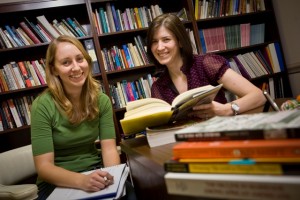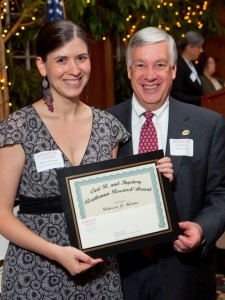
Professor Rebecca Kissane, right, advised Amanda Berger ’09 on her honors thesis focusing on the social implications of single-mother families.
The lines above her brow etched deep by grinding despair, a woman shares her story of not having enough money at the end of the month. Across from her, Rebecca Kissane, associate professor of anthropology and sociology, listens. For Kissane, it is a heartbreaking tale increasingly heard.
Unmasking poverty in America and the inequalities that spawn it earned Kissane the 2011 Carl R. and Ingeborg Beidleman Research Award from Lafayette. Her fieldwork continues to garner awards for applied research and scholarship, as she puts a human face on cold, hard numbers.
“The type of scholarship I do is meant to inform policy and practice,” Kissane says,” how we think about poverty, design solutions, and improve upon how social service practitioners deal with disadvantaged populations. This isn’t research for research’s sake but a way to enact solutions in the real world that impact how we deal with these issues at the ground level.”

Edward Ahart ’69, chair of the Board of Trustees, presents Professor Rebecca Kissane with the Carl R. and Ingeborg Beidleman Research Award recognizing excellence in applied research or scholarship.
Kissane, a prolific researcher, had three peer-reviewed articles published in 2010 that focused on such topics as the effect of residential location in determining a family’s success or failure in connecting with social services, a review of the literature published in the 2000s on families in poverty, and the fallout from Clinton-era welfare reform. Her article on nonprofits that assist in welfare and subsidized employment strategies was voted the top article of 2010 in Sociological Perspectives, the journal of the Pacific Sociological Association.
Though she maintains an academician’s eye, Kissane witnessed firsthand the tensions caused by money stretched to the limit. “I grew up in a working class household,” she says of her upbringing in an Irish Catholic immigrant family. “There were a lot of weekends spent watching my mom at the dining room table struggling to pay bills.”
Scholarships made it possible for Kissane to attend Villanova, and a campus ministry plugged her into serving in a soup kitchen. The combination of her faith, service, and a sociology class in her junior year directed her path. “All of the sudden, there were these connections. ‘Oh, this is what I’m seeing in the soup kitchen and learning about in the classroom.’ Something clicked,” she recalls. “I knew that is where I wanted to head in my career.”
Kissane works hard to pass that zeal onto her students. However, given the intractable nature of poverty and social inequality, she takes students into those depths with their eyes wide open. Her exercise in having students prepare a $22,000 budget for a family of four —the approximate poverty line in the United States for 2010—highlights the daily frustrations of the poor, especially those living in high-cost metropolitan areas.
“I warn students that this is not a ‘happy class,’ because we discuss many problems,” Kissane says. “Even when I talk about policy solutions, we take a critical eye, because many of them don’t work, or they have short-term gains and then fall behind.”
Because she values scholarship so highly, Kissane also works with students as an honors thesis adviser and reader. In addition, she initiates student-faculty research through the EXCEL Scholars program and helps students create independent study programs that examine poverty and social inequality.
Kissane’s experiences in listening to the stories of the poor that undergird her research create opportunities to improve their lives. Along the way, those tales have fueled her own passion in life: “I’m motivated to give voice to the marginalized populations that are too often not heard, are misunderstood, or are stereotyped, and to help find ways to reduce social inequality and hardship in the United States.”

